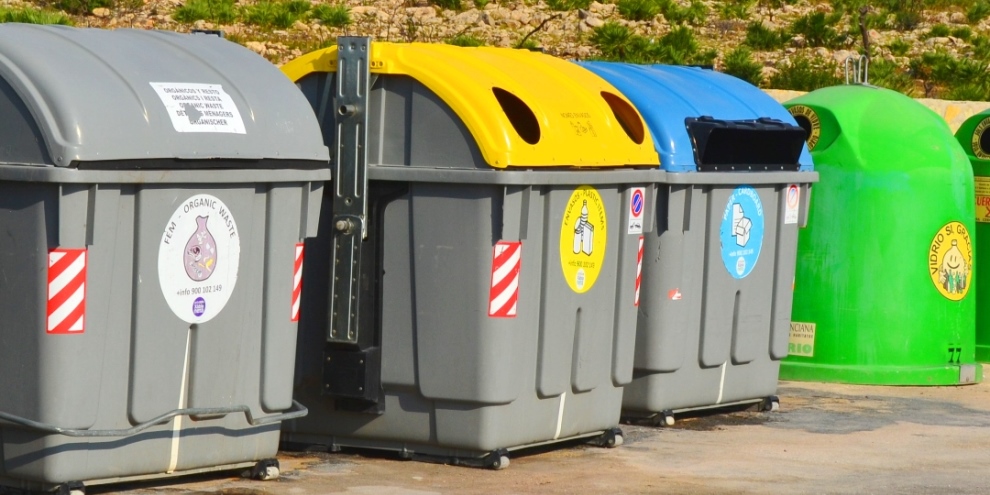
Jávea has a decent record for proper waste management and a clear recycling policy. There is also an Ecoparque for the collection of waste which can’t be deposited in the normal bins and a special location for the management of garden refuse.
What is recycling?
Waste products are those things that have already been used and no longer have any value. In many cases, these waste products contain valuable materials that can be recovered and recycled.
These days we generate a large amount of waste which needs to be disposed of, so recycling helps the environment by saving raw materials because paper, cardboard, glass, plastic and metal can be reused again and again, saving water and energy because less of both is used to make new products from recycled and reclaimed materials than from raw materials and reducing the amount of waste by reducing the volume in landfills.
Consider the three R’s:
REDUCE
Try to reduce waste generation. For example, take your own bags to the market / supermarket.
REUSE
Think about using products for other purposes before throwing them away. For example, you could use old clothing as cleaning clothes.
RECYCLE
Deposit recyclable material in the containers provided throughout the town whilst other products can be taken to the Ecoparque.
Recycling in the Home
Recycling in the home is not complicated, you just have to be a little bit organised. The simplest method is to have four different containers: one for glass, one for paper and cardboard, one for lightweight containers (plastic, cans and cartons) and one for organic matter.
You can determine if a product can be recycled by special symbols, the most common of which is the universal recycling symbol formed from three mutually chasing arrows that form a Möbius strip. This symbol often comes with a number inside or initials which indicate the material from which the product has been made.
Be aware that the symbol only indicates that the product can be recycled, not that it has been made from recycled products.
An explanation of what can be deposited in which bin is given below.
The Ecoparque
OPENING TIMES
Sep-May: 9.00am-1.30pm, 3.30pm-5.30pm
Jun-Aug: 9.00am-1.30pm, 4.00pm-8.00pm
Closed Sunday
The Ecoparque is a municipal installation provided for residents and businesses based in Xàbia to throw away those items which cannot be deposited in the bins.
For example, domestic appliances such as fridges, microwaves, vacuum cleaners, kettles and toasters; electrical and electronic equipment such as computers, laptops, video cameras, televisions, DVD players and stereo systems; furniture; lightbulbs of all kinds; furniture; used cooking oil; broken mirrors; old cleaning equipment such as brooms and mops, etc.; and sports equipment, games, etc.
Garden refuse and waste generated by gardeners or other similar professions cannot be deposited in the Ecoparque. There is a separate collection area in Ramblars for this type of waste.
Ramblars
OPENING TIMES
Winter (November – March)
8.00am-6.00pm Mon-Fri, 8.00am-1.00pm Sat
Spring (April, May, June, September, October)
8.00am-7.00pm Mon-Fri, 8.00am-1.00pm Sat
Summer (July and August)
7.30am-4-30pm Mon-Fri, Closed Saturday
Ramblars is open to legally registered individuals and companies who offer gardening services within the municipality borders.
It is also open to residents of Xàbia (so long as the waste comes from homes or land within the municipality borders) and is free of charge.
Collection Service
There is a FREE collection service of household applicances. Call 900 102 149 to arrange collection.
The Recycling Bins Explained
In the urban areas, there are underground rubbish collection points in many places, normally in squares or at road junctions. Rubbish should be deposited inside and not placed around the bins as these are automated systems which lift up when the containers are emptied.
Out in the urbanisations, there are a number of rubbish and recycling points, known as Punt Verds, consisting of a line of bins coloured depending on the products to be deposited. Rubbish should be placed inside the containers and not placed around them. If they are full, it may be necessary to drive to the nearest alternative. Inspection teams from the Town Hall can fine people who abuse the collection areas.
LINK: Locations of Punt Verds in Jávea [External Link]
For organic waste, the grey bins should be used.
GLASS
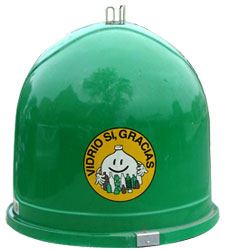
You can put in this container:
– glass bottles and jars
You cannot put in this container:
– the bottle tops
– drinking glasses, wine glasses
– glass plates
– glass vases
– lightbulbs
– glass windows
– mirrors
– car windscreens
– glass tables
– medicine containers
– ceramic, porcelain or clay articles
– brick or stone articles
The glass that is collected is taken to a treatment plant where it is cleaned and then ground to form ‘cullet’ that is used to make new bottles and jars. 100% of any glass bottle or jar deposited in the green bins can be recycled with the same qualities.
Advice for the recycling of glass:
– use a box or recycling bag to collect glass bottles and jars suitable to recycling;
– empty the contents of the container and rinse if necessary to eliminate bad smells;
– remove the bottle tops as they cannot be recycled in the same container;
– try not to accumulate too many recyclable glass items to avoid too much effort to take them to the green container;
– if necessary, use a shopping trolley to transport the recyclable material to the container;
– be aware of the possibility of broken glass, especially if using a plastic recycling bag;
– when depositing the glass bottles and jars into the container, try not to make too much noise;
– remove the bottles and jars from the box or recycling bag before depositing them into the container.
BE AWARE
Crystal glasses are made with heavy metals in their composition and are therefore those which have been broken should not be thrown into the green container but taken to the municipal EcoParque.
PAPER AND CARDBOARD
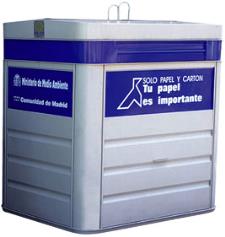
You can put in this container:
– paper and cardboard
– newspapers and magazines
– cardboard boxes and containers
– receipts and invoices
You cannot put in this container:
– cartons (milk, juice, etc.)
– paper towels and napkins
– food-tainted boxes (pizza, etc.)
– photographs and x-rays
– boxes coated with wax, metal, etc.
– medical products
– wood
The paper and cardboard that is collected is used to produce new boxes, wrapping paper, stationary items, magazines, newspaper, books, etc. The quality of recycled paper has improved much in the last few years.
Advice for the recycling of paper and cardboard:
– use a box, basket or paper bag to collect paper and cardboard suitable to recycling;
– when unpacking the shopping, remove the packaging when possible, such as that for yogurts and drinks, for recycling;
– crush any boxes to save space whilst storing before taking to the container;
– if possible, remove staples, clips and spirals before putting into the container.
BE AWARE
If you are throwing away personal information, ensure that you shred the paper adequately. Cartons, such as those for milk and fruit juices, are made not only of cardboard but can also include other materials such as plastic and aluminium. They can be recycled but only by depositing them in the yellow container.
PACKAGING
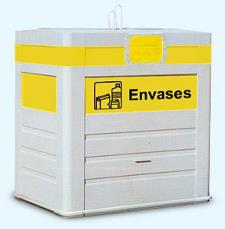
You can put in this container:
– plastic bottles and jars
– plastic boxes and trays
– plastic wrapping
– steel or aluminium tins and cans
– aluminium trays
– cartons (milk, juice, wine, etc.)
– plastic shopping bags
– bottle tops and lids
You cannot put in this container:
– suitcases or briefcases
– wallets, purses or handbags
– lighters, pens or cassettes
– medical products
– furniture
– toys
– clothing
– kitchen utensils
The packaging that is collected is taken to a selection plant where it is separated into the material with which is has been made (aluminium, steel, plastic, etc.) and used again as source material to make new products. For example, 40 plastic bottles can be used to make a fleece jacket whilst 80 tins can make a bicycle tyre.
Advice for the recycling of packaging:
– use a plastic bag to collect packaging suitable to recycling;
– empty the packaging and rinse out if necessary to reduce bad smells;
– crush any plastic bottles or packaging to save space whilst storing before taking to the container;
– don’t deposit anything other than plastic packaging, tins or cartons for milk, juices, wine, etc. in the container.
MEDICINE AND ITS PACKAGING
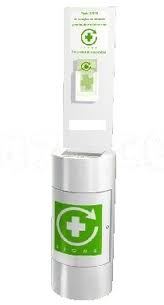
You can put in this container:
– empty medicine bottles
– medicines no longer required
– out-of-date medicines
You cannot put in this container:
– thermometers
– syringes, needles or sharp objects
– prosthesis
– gauzes
– x-rays.
The medicine that is collected is taken to a treatment plant where it is separated into recyclable materials, such as the packaging of paper and card, plastics, glass and metals which is then sent to the appropriate recycling business, and into non-recyclable materials which is taken to an energy recovery plant where it is incinerated to obtain electric power.
Advice for the recycling of medicine and its packaging:
– the special containers can be found in most chemists;
– empty the packaging and rinse out if necessary to reduce bad smells;
– crush any bottles or packaging to save space whilst storing before taking to the container.
Source: “Manual de buenas prácticas: Gestionar los residuos en el Hogar” (Generalitat Valenciana)

